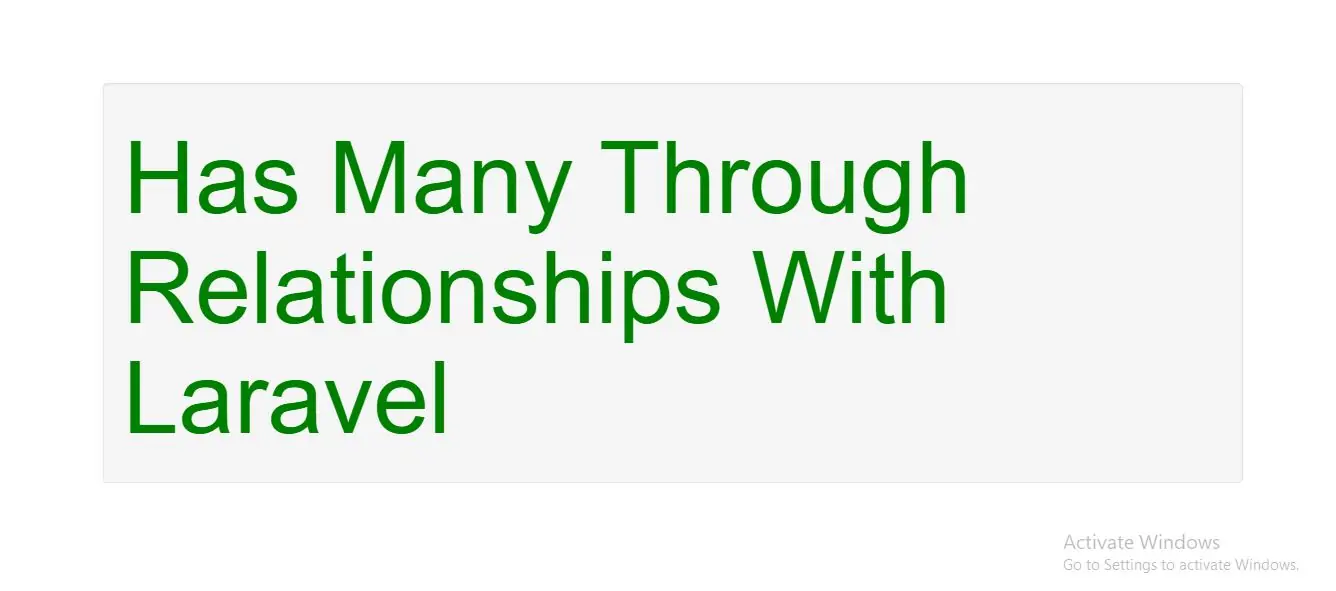
Has Many Through Relationships
Lets start.
How to define Has Many Through Eloquent Relationship
For example, a Country model might have many Post models through an intermediate User model. In this example, you could easily gather all blog posts for a given country. Let's look at the tables required to define this relationship:
1.Create laravel project and connect to database in .env file.
composer create-project laravel/laravel World --prefer-dist
2.Create Model and Migrate it.
To implement Has One Through Relationships in Laravel, we need models: Country ,Post and Users.
Country,Post and Users models in fresh project so for that run below commands in comand prompt.
php artisan make:model Country -m
php artisan make:model Post -m
php artisan make:model User -m
3.After Created Models we need to Implement code in Model and migration files as below
Migration files
2020_09_07_111458_create_countries_table.php
<?php
use Illuminate\Support\Facades\Schema;
use Illuminate\Database\Schema\Blueprint;
use Illuminate\Database\Migrations\Migration;
class CreateCountriesTable extends Migration
{
public function up()
{
Schema::create('countries', function (Blueprint $table) {
$table->bigIncrements('id');
$table->string('name');
$table->timestamps();
});
}
public function down()
{
Schema::dropIfExists('countries');
}
}
2020_09_07_111619_create_posts_table.php
<?php
use Illuminate\Support\Facades\Schema;
use Illuminate\Database\Schema\Blueprint;
use Illuminate\Database\Migrations\Migration;
class CreatePostsTable extends Migration
{
public function up()
{
Schema::create('posts', function (Blueprint $table) {
$table->bigIncrements('id');
$table->string('title');
$table->bigInteger('user_id ')->unsigned()->index();
$table->foreign('user_id')->references('id')->on('users')
->onDelete('cascade');
$table->timestamps();
});
}
public function down()
{
Schema::dropIfExists('posts');
}
}
<?php
use Illuminate\Support\Facades\Schema;
use Illuminate\Database\Schema\Blueprint;
use Illuminate\Database\Migrations\Migration;
class CreateUsersTable extends Migration
{
public function up()
{
Schema::create('users', function (Blueprint $table) {
$table->bigIncrements('id');
$table->string('name');
$table->bigInteger('country_id')->unsigned()->index();
$table->foreign('country_id')->references('id')->on('countries')
->onDelete('cascade');
$table->timestamps();
});
}
public function down()
{
Schema::dropIfExists('users');
}
}
php artisan migrate
Country .php
<?php
namespace App;
use Illuminate\Database\Eloquent\Model;
class Country extends Model
{
protected $fillable = [
'name'
];
public function posts()
{
return $this->hasManyThrough(
'App\Post',
'App\User',
'country_id', // Foreign key on users table...
'user_id', // Foreign key on posts table...
'id', // Local key on countries table...
'id' // Local key on users table...
);
}
}
<?php
namespace App;
use Illuminate\Database\Eloquent\Model;
class Post extends Model
{
protected $fillable = [
'user_id','title '
];
}
User.php
<?php
namespace App;
use Illuminate\Notifications\Notifiable;
use Illuminate\Contracts\Auth\MustVerifyEmail;
use Illuminate\Foundation\Auth\User as Authenticatable;
class User extends Authenticatable
{
use Notifiable;
protected $fillable = [
'name', 'country_id',
];
}
4.Create route and controller to access data.
Route in Web.php
Route::get('hasmany','WorldController@hasmany');
Create WorldController.php using below command in command prompt
php artisan make:controller WordController
<?php
namespace App\Http\Controllers;
use Illuminate\Http\Request;
use App\User;
use App\Country;
use App\Post;
class WordController extends Controller
{
//
public function hasmany()
{
$country = Country::find(1);dd($country->posts);
return 'done';
}
}